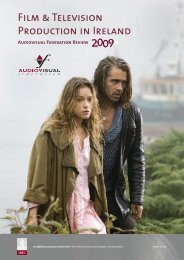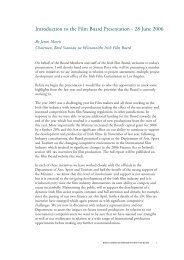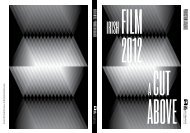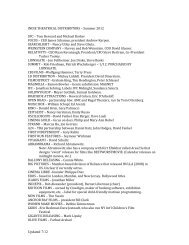Broadcasting Commission of Ireland Policy Paper - Irish Film Board
Broadcasting Commission of Ireland Policy Paper - Irish Film Board
Broadcasting Commission of Ireland Policy Paper - Irish Film Board
You also want an ePaper? Increase the reach of your titles
YUMPU automatically turns print PDFs into web optimized ePapers that Google loves.
IntroductionDiscussion <strong>Paper</strong><strong>Broadcasting</strong> <strong>Commission</strong> <strong>of</strong> <strong>Ireland</strong> - Innovation FundMarch 2004The <strong>Broadcasting</strong> <strong>Commission</strong> <strong>of</strong> <strong>Ireland</strong> (BCI) - Innovation Fund wasintroduced via the enactment <strong>of</strong> the <strong>Broadcasting</strong> (Funding) Act 2003. TheBCI - Innovation Fund represents 5% <strong>of</strong> annual television licence fee revenue.The fund will be managed by the <strong>Broadcasting</strong> <strong>Commission</strong> <strong>of</strong> <strong>Ireland</strong>, whichis under the aegis <strong>of</strong> the Department <strong>of</strong> Communications, Marine and NaturalResources.From the <strong>Broadcasting</strong> (Funding) Act 2003, the schemes for the granting <strong>of</strong>funds are to support all or any <strong>of</strong> the following:(a) new television or radio programmes on <strong>Irish</strong> culture, heritage andexperience including –(i) history(ii) historical buildings(iii) the natural environment(iv) folk, rural and vernacular heritage(v) traditional and contemporary arts(vi) the <strong>Irish</strong> language and the <strong>Irish</strong> experience in European andinternational contexts(b) new television and radio programmes to improve adult literacy(c) programmes under (a) and (b) in the <strong>Irish</strong> language(d) the development <strong>of</strong> archiving <strong>of</strong> programme material produced inthe State.The scheme(s) may only fund television programmes which are broadcast onfree-to-air television or on a cable or MMD as part <strong>of</strong> a community contextcontract and which are broadcast during peak viewing times (except forchildren’s or educational programmes). Separate provisions are made in theAct for the broadcast <strong>of</strong> funded radio programmes.BackgroundWith an annual allocation <strong>of</strong> approximately €8 million, the Innovation Fund is avery significant addition to the <strong>Irish</strong> film and television industry. Presently,Bord Scannán na hÉireann/ the <strong>Irish</strong> <strong>Film</strong> <strong>Board</strong> (BSE/IFB) annual capitalfunding for 2004 is €10 million. Traditionally, the <strong>Board</strong> has not had theresources to support a wide range <strong>of</strong> television projects and has largelyconcentrated on the development <strong>of</strong> the industry via short films and theBord Scannán na hÉireann/ the <strong>Irish</strong> <strong>Film</strong> <strong>Board</strong> BCI Discussion <strong>Paper</strong> 1/6
development and production <strong>of</strong> feature films. Of the16 feature films shot in<strong>Ireland</strong> in 2003, 11 received funding from Bord Scannán na hÉireann/ the <strong>Irish</strong><strong>Film</strong> <strong>Board</strong>.<strong>Film</strong> is inherently an international enterprise. The vast majority <strong>of</strong> <strong>Irish</strong> featurefilms are financed from multiple sources including finance from overseasfrom: broadcasters, production companies, sale agents/distributors,government agencies and or tax funds. Independent films are generallyreliant on overseas sales to return their budgets and go into pr<strong>of</strong>it.While <strong>Ireland</strong> has a strong history <strong>of</strong> attracting overseas production such asBraveheart and King Arthur; competition to attract such films is growing withNew Zealand, Australia and Eastern Europe <strong>of</strong>fering packages <strong>of</strong> attractiveincentives to attract <strong>of</strong>fshore production to their countries.Because <strong>of</strong> the global competition for the limited funds available for featurefilms and the competitive nature <strong>of</strong> <strong>of</strong>fshore production, a vibrant pr<strong>of</strong>essionaldomestic television industry should provide the backbone to support the <strong>Irish</strong>film and television industry. Continual domestic television production providesstable cultural, export, employment, training and pr<strong>of</strong>essional developmentoutcomes. A buoyant <strong>Irish</strong> television sector can support the more inconstantfeature film sector.The <strong>Irish</strong> television sector is complex given that the majority <strong>of</strong> homes receivestations from outside the State. However, current ratings indicate that <strong>Irish</strong>viewers are interested in seeing <strong>Irish</strong> content on their screens.In order to foster a vibrant and popular domestic television sector, theInnovation Funds for television should be applied across a diverse range <strong>of</strong>programming including drama – series, telemovies and feature film, comedy,children’s drama and documentaries.The advent <strong>of</strong> the Innovation Fund is a unique opportunity to stimulatediverse, innovative, quality <strong>Irish</strong> television content on a permanent basis.There should be significant employment, pr<strong>of</strong>essional development andexport benefits.These benefits can only be achieved via careful structuring <strong>of</strong> the fundingprogrammes in the coming months. Drawing on the experience <strong>of</strong> similarfunds overseas, while having regard to the framework <strong>of</strong> the <strong>Irish</strong> legislation,BSE/IFB believes the <strong>Irish</strong> production and broadcasting sectors should striveto ensure that the fund is structured to enable access by independentproductions with Broadcaster commitment/funding attached that demonstrateinnovation, national significance and, perhaps, some degree <strong>of</strong> market failurein terms <strong>of</strong> closing a financing gap.Discussion PointsAdditionalityBord Scannán na hÉireann/ the <strong>Irish</strong> <strong>Film</strong> <strong>Board</strong> BCI Discussion <strong>Paper</strong> 2/6
Measured against the Australian, New Zealand, Western European orCanadian context (where there are either television content quotas and orbroadcasting commissions that finance local content), the gaps in the <strong>Irish</strong>independent production co-financing sector are wide and BSE/IFB believesthe TV portion <strong>of</strong> the Innovation Fund would be most effectively used inaddressing those gaps, while still meeting the spirit <strong>of</strong> the legislation.However, it is understood that there will be a criteria <strong>of</strong> ‘additionality’ to triggerBCI funding, meaning applicants must demonstrate that without BCI funds theprogramme would not be made. This means, in practical terms, if the industrywould like to work with the BCI as a gap financier, the challenge during theconsultation process is for the industry to demonstrate that without the BCIfilling a financing gap on, say, an <strong>Irish</strong> language documentary already partfunded by TG4 and BSE/IFB, it will not proceed to production. Likewise, theindustry shall have to demonstrate clearly to the BCI the challenges infinancing children’s TV drama and, perhaps most <strong>of</strong> all, the severe challenges<strong>of</strong> financing feature films on very <strong>Irish</strong> topics without the benefit <strong>of</strong> significantTV investment that is common in Canada, Australia and continental Europe.Disbursement <strong>of</strong> FundsPresently, there is no provision in the legislation regarding whether the moneyis distributed directly to broadcasters or the independent sector. BSE/IFBbelieves there should be bias for the funds for television (includingeducational programming) being distributed to independent producers with TVpresales attached to their projects. Having the Fund mandated to deal withindependent producers might help keep a level playing field betweenbroadcasters with in house production capabilities and those which arecommissioning broadcasters.Should the Fund only provide funding directly to the Broadcasters, it couldhave a distorting effect on the market in terms <strong>of</strong> producers selling scriptsdirectly to one broadcaster (with an internal production capacity which couldthen handle all BCI applications) over the others and may mitigate againstcontent diversity.GenreAt present, BCI has no firm views on how the Funds should be split betweencontent genres. BSE/IFB believes the BCI could consider devisingexpenditure targets between genres, including: documentary, children’sdrama, drama series/mini-series, pilots, telemovies/feature films andeducational programming.Development and OverheadsIt is understood the BCI Fund shall not be applied to development oroverheads. Available funding for development and overheads for independentproducers is limited. Therefore, there is an important role for BSE/IFB as theBord Scannán na hÉireann/ the <strong>Irish</strong> <strong>Film</strong> <strong>Board</strong> BCI Discussion <strong>Paper</strong> 3/6
agency developing the talent behind much <strong>of</strong> the content that will look to theBCI Fund for co-financing.Key issues:BSE/IFB believe the following are areas <strong>of</strong> special significance for the Fundgoing forward:Children’s Drama and AnimationThere is currently no minimum requirement for <strong>Irish</strong> broadcasters tocommission locally produced children’s drama, which has considerablecultural ramifications - <strong>Irish</strong> children grow up watching US and UK showswhich do not necessarily reflect their own culture.This is a key area where the BCI funds could be applied. Children’s dramaalso provides pr<strong>of</strong>essional development opportunities, especially for writersand directors, as well as being full-scale additional productions for crew andcast. In addition to the cultural and industrial merits <strong>of</strong> stimulating localchildren’s drama series, this is an area with a large base <strong>of</strong> overseas c<strong>of</strong>inancingpartners and international slots for the content.National Interest DocumentaryFunds could be allocated for documentary projects <strong>of</strong> national interest –cultural, historical, social, history or arts projects that may not ordinarily befully funded by the broadcasters.These could be in the form <strong>of</strong> accord projects – a specific number <strong>of</strong> projectsper annum per broadcaster, at set budget levels (including licence fees)produced by independent producers on behalf <strong>of</strong> the broadcasters. BSE/IFBcould potentially be involved as a small gap financier.There is little doubt that there is an appetite on the part <strong>of</strong> the industry toproduce a large number <strong>of</strong> documentaries and demand for BSE/IFB funds inthis area far outstrips available funds for this important genre. Having the BCIFund working as outlined above, will allow BSE/IFB to focus more fully onlarger scale and theatrical documentaries while co-financing in a smaller waythe national interest documentaries, should there be a small gap.Market FailureThe Innovation Fund could be used to address areas <strong>of</strong> the industry which arecurrently considered areas <strong>of</strong> market failure. Market failure could be definedas those programmes <strong>of</strong> high quality or national importance (or both) thathave difficulty raising 100% <strong>of</strong> their budgets from existing financingmechanisms.Bord Scannán na hÉireann/ the <strong>Irish</strong> <strong>Film</strong> <strong>Board</strong> BCI Discussion <strong>Paper</strong> 4/6
At various times, this definition could be applied to quality (and very locallyfocused) <strong>Irish</strong> documentaries, telemovies, feature films, mini-series andchildren’s programmes. Should these projects (in content terms) meet thecultural criteria <strong>of</strong> the fund they could then be part financed by the InnovationFund. Careful criteria regarding <strong>Irish</strong> elements would be required.When the present level <strong>of</strong> licence fees and the necessity for large wagedeferrals are taken into account, it could be argued that many programmesmentioned above (including low budget feature films) fall into the area <strong>of</strong>market failure, thus meaning there is a very important role for the BCIInnovation Fund to play in this regard.InnovationDrawing on the experiences <strong>of</strong> the Australian Commercial TV ProductionFund and NZ On Air, BSE/IFB believes innovation should be a key criteria forat least part <strong>of</strong> the Fund’s expenditure. The Fund’s existence should allow fora type <strong>of</strong> riskier, innovative and/or experimental programmes to find their wayon air that the broadcasters might not otherwise consider taking the risk <strong>of</strong>financing from script stage.This could be in the form <strong>of</strong> pilot programmes such as drama and comedy halfhours, hours, telemovies and feature films. Should these pilots go on to becommissioned as series, they could perhaps be financed without the support<strong>of</strong> the Innovation Fund.Minimum Licence FeesBSE/IFB understands that the Fund shall require projects to have abroadcaster commitment to transmission in order to be eligible for funding.BSE/IFB believes this commitment should clearly be in the form <strong>of</strong> a presaleor investment by the broadcasters. It will be for the BCI to consider variousmechanisms to determine the appropriateness <strong>of</strong> the broadcaster licence feelevel.Levels <strong>of</strong> fundingThe Fund will be approximately €8 million per annum. A portion <strong>of</strong> fundingmust be applied to community radio, a portion to archiving and the balanceapplied to television - prime time, except for educational and children’sprogrammes.BSE/IFB believes the amounts for non-TV content should be spelt out clearlyat the start <strong>of</strong> the operation <strong>of</strong> the Fund.Overall, BSE/IFB would favour the Fund taking a co-financier approach(rather than a near full financier) to enable these funds to be stretched overthe widest amount <strong>of</strong> content possible, while also providing producers with theopportunity to continue to raise other sources <strong>of</strong> finance. It is highly desirableBord Scannán na hÉireann/ the <strong>Irish</strong> <strong>Film</strong> <strong>Board</strong> BCI Discussion <strong>Paper</strong> 5/6
that programmes funded by the Innovation Fund are able to be exploited inoverseas markets i.e. cast and music rights are bought out in full as part <strong>of</strong>the budget <strong>of</strong> the programme. This would allow producers to potentially makea pr<strong>of</strong>it via export and have positive cultural benefits.CriteriaBSE/IFB believes the fund should aim to:• support high quality <strong>Irish</strong> content in a way that will increase the amount,diversity and quality <strong>of</strong> <strong>Irish</strong> drama, documentaries and children’sdrama programmes;• provide a boost for domestic production and provide pr<strong>of</strong>essionaldevelopment opportunities for practitioners;• encourage a representative portrayal <strong>of</strong> <strong>Irish</strong> cultural diversity;• encourage programmes with export potential, although the projectsshould be primarily aimed at an <strong>Irish</strong> audience; and• support the development <strong>of</strong> libraries <strong>of</strong> <strong>Irish</strong> controlled copyright.Assessment ProcessBSE/IFB believes that clear funding guidelines should be written in relation toeach area <strong>of</strong> funding available from the Innovation Fund. These should setout what materials are required <strong>of</strong> applicants, level <strong>of</strong> funding available,application process, selection criteria and legal requirements together with thecycle <strong>of</strong> decision-making.BSE/IFB believes applications should be assessed by a small panel <strong>of</strong> variouspractising industry pr<strong>of</strong>essionals (excluding employees <strong>of</strong> broadcasters)together with representatives <strong>of</strong> the BCI <strong>Board</strong>. This would provide a current,well rounded view <strong>of</strong> the <strong>Irish</strong> industry. Clear guidelines for addressingconflict <strong>of</strong> interest issues for the assessment panel should be introduced. Asmall executive could manage the day-to-day operation <strong>of</strong> the Fund.Expertise in the areas <strong>of</strong> script and budget assessments could be drawn onas required ie outsourced. Broadcast expertise from overseas could bebrought-in as required.BSE/IFB involvementAs the Innovation Fund can only support production, it will be vital thatprojects are well developed before seeking support from the fund. Generally,the documentary development process takes at least 4 to 12 months anddrama projects at least 6 months to 2 or more years. BSE/IFB has a keydevelopmental role as one <strong>of</strong> the agencies developing projects and talent.In the event that the combination <strong>of</strong> support from broadcasters (licence feesand equity) together with the Innovation Fund leaves a financing gap,BSE/IFB should be able to co-finance some projects provided that they meetfunding criteria for both funders.Bord Scannán na hÉireann/ the <strong>Irish</strong> <strong>Film</strong> <strong>Board</strong> BCI Discussion <strong>Paper</strong> 6/6
















